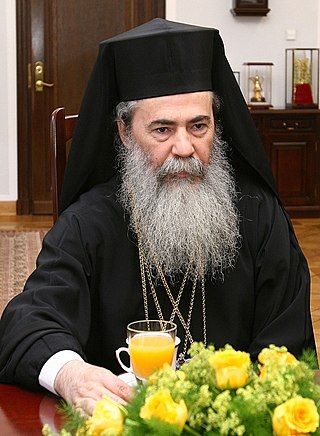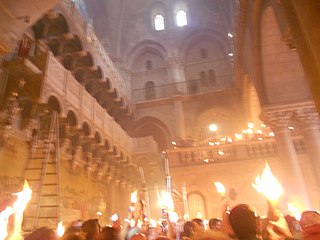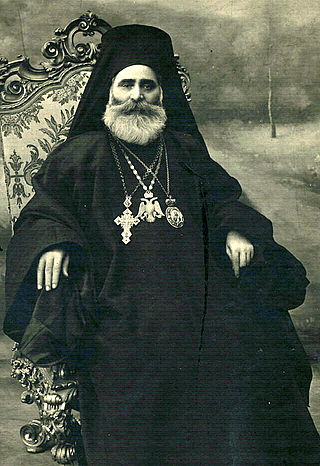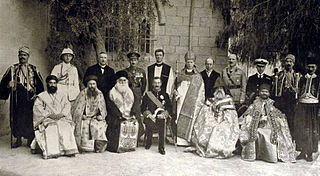The Eastern Orthodox Church, officially the Orthodox Catholic Church, is a communion composed of up to seventeen separate autocephalous (self-governing) hierarchical churches that profess Eastern Orthodoxy and recognise each other as canonical (regular) Eastern Orthodox Christian churches.
In Christian denominations, an archbishop is a bishop of higher rank or office. In most cases, such as the Catholic Church, there are many archbishops who either have jurisdiction over an ecclesiastical province in addition to their own archdiocese, or are otherwise granted a titular archbishopric. In others, such as the Lutheran Church of Sweden, the title is only borne by the leader of the denomination.

The ecumenical patriarch is the archbishop of Constantinople (Istanbul) and New Rome, and primus inter pares among the heads of the several autocephalous churches which compose the Eastern Orthodox Church. The ecumenical patriarch is regarded as the representative and spiritual leader of the Eastern Orthodox Christians worldwide. The term ecumenical in the title is a historical reference to the Ecumene, a Greek designation for the civilised world, i.e. the Roman Empire, and it stems from Canon 28 of the Council of Chalcedon.
This is a directory of patriarchs, archbishops, and bishops across various Christian denominations. To find an individual who was a bishop, see the most relevant article linked below or Category:Bishops.
The highest-ranking bishops in Eastern Orthodoxy, Oriental Orthodoxy, the Catholic Church, the Hussite Church, Church of the East, and some Independent Catholic Churches are termed patriarchs.

Patriarchate is an ecclesiological term in Christianity, designating the office and jurisdiction of an ecclesiastical patriarch. According to Christian tradition three patriarchates were established by the apostles as apostolic sees in the 1st century: Rome, Antioch, and Alexandria. Constantinople was added in the 4th century and Jerusalem in the 5th century. Eventually, together, these five were recognised as the pentarchy by the Council of Chalcedon in 451.

An exarch was the holder of any of various historical offices, some of them being political or military and others being ecclesiastical.

The Latin Patriarchate of Jerusalem is the Latin Catholic ecclesiastical patriarchate in Jerusalem, officially seated in the Church of the Holy Sepulchre. It was originally established in 1099, with the Kingdom of Jerusalem encompassing the territories in the Holy Land newly conquered by the First Crusade. From 1374 to 1847 it was a titular see, with the patriarchs of Jerusalem being based at the Basilica di San Lorenzo fuori le Mura in Rome. Pope Pius IX re-established a resident Latin patriarch in 1847.

The Greek Orthodox patriarch of Jerusalem or Eastern Orthodox patriarch of Jerusalem, officially patriarch of Jerusalem, is the head bishop of the Greek Orthodox Patriarchate of Jerusalem, ranking fourth of nine patriarchs in the Eastern Orthodox Church. Since 2005, the Eastern Orthodox patriarch of Jerusalem has been Theophilos III. The patriarch is styled "Patriarch of the Holy City of Jerusalem and all Holy Land, Syria, beyond the Jordan River, Cana of Galilee, and Holy Zion." The patriarch is the head of the Brotherhood of the Holy Sepulchre, and the religious leader of about 130,000 Eastern Orthodox Christians in the Holy Land, most of them Palestinian Christians in Israel and Palestine.
Macarius is a Latinized form of the old Greek given name Makários (Μακάριος), meaning "happy, fortunate, blessed"; confer the Latin beatus and felix. Ancient Greeks applied the epithet Makarios to the gods.

The Greek Orthodox Patriarchate of Jerusalem, also known as the Greek Orthodox Church of Jerusalem, is an autocephalous church within the wider communion of Eastern Orthodox Christianity. Established in the mid-fifth century as one of the oldest patriarchates in Christendom, it is headquartered in the Church of the Holy Sepulchre in Jerusalem and led by the patriarch of Jerusalem, currently Theophilos III. The patriarchate's ecclesiastical jurisdiction includes roughly 200,000 to 500,000 Orthodox Christians across the Holy Land in Palestine, Jordan and Israel.
Patriarchate, Archdiocese, Diocese, Territory, or Exarchate of Jerusalem may refer to:

In Orthodox Christian belief, the Holy Fire is a ceremony that occurs every year at the Church of the Holy Sepulchre in Jerusalem on Great Saturday, the day before Orthodox Easter.

Meletius, was primate of the Church of Greece from 1918 to 1920 as Meletius III, after which he was Ecumenical Patriarch of Constantinople as Meletius IV from 1921 to 1923 and Greek Patriarch of Alexandria as Meletius II from 1926 to 1935. He is the only man in the history of the Eastern Orthodox Church to serve successively as the senior bishop of three autocephalous churches.
Dositheus is a Greek masculine given name, and it may refer to:

Christians have made many contributions in a broad and diverse range of fields, including the sciences, arts, politics, literatures, sports and business.

The Church of Sinai is a Greek Orthodox autonomous church whose territory consists of St. Catherine's Monastery at the foot of Mount Sinai in Egypt, along with several dependencies. There is a dispute as to whether the church is fully autocephalous or merely autonomous. The church is headed by the Archbishop of Mount Sinai and Raithu, who is traditionally consecrated by the Greek Orthodox Patriarch of Jerusalem and also serves as abbot for the monastery. The current hierarch is Archbishop Damian.
The Patriarchate of Alexandria is the office and jurisdiction of the bishop of Alexandria in Egypt, referred to since 531 as Patriarch of Alexandria. It originated from Mark the Evangelist and developed until the Council of Chalcedon in 451 when it split into parallel Chalcedonian and Miaphysite traditions, which then competed for the position for several decades before permanently parting ways in 536:
Gerasimos is a Greek given name derived from Greek "γέρας". The suffix -ιμος gives the meaning "the one who deserves honour". It can also be anglicized as "Gerassimos" or "Gerasimus". It can also be slavicized as Gerasim.

The Holy and Ancient Archdiocese of Jerusalem, All Palestine, and All the Near East or the Coptic Orthodox Patriarchate in Jerusalem, is a Metropolitan Archdiocese of the Coptic Orthodox Church, which is part of the wider communion of the Oriental Orthodox Church. It is headed by the Coptic Orthodox Metropolitan Archbishop of Jerusalem, the incumbent being Metropolitan Archbishop Antonious of Jerusalem since 2016. Its jurisdiction covers those Coptic Orthodox Christians living in the Near East; with churches and monasteries in the State of Israel, State of Palestine, the State of Kuwait, the Hashemite Kingdom of Jordan, the Lebanese Republic, the Syrian Arab Republic, and the Republic of Iraq. The adherents are largely of Coptic Egyptian descent, mainland Coptic migrants and their descendants. The archdiocese is based at St Anthony's Monastery, in the Christian Quarter of the Old City of Jerusalem, beside the Church of the Holy Sepulchre.










